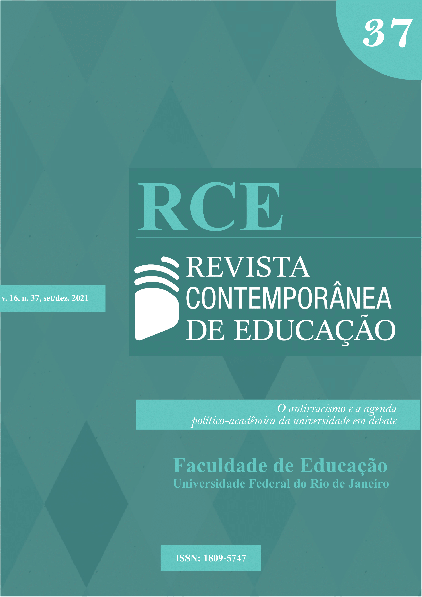Resumo
Education has been depicted as the main ‘social elevator’ to confront the internal inequalities of modern abyssal societies. Roma, as the largest, ancient European minority, are perpetually targeted as a ‘sensitive’ population in regard to access to and success in basic and higher education, creating a framework where Roma themselves, from an early age, are considered a ‘problem’. Academia, scientific research and knowledge production are not isolated from these practices and political/epistemological framework. In this sense, the article unravels its complicity and responsibility in the maintenance of the white order, the modern civilisatory mission toward the racialised bodies and the ‘ideology of integration’ as the only possible political path. This paper discusses the current academic production of evidence-based research in the field of education in regards to Roma, exploring the semantics and conceptual constructions that frame the discussion related to the Roma experience in the educative system. Furthermore, the article discusses how the conceptual codification of such a framework actually serves to condition intellectual and political approaches that attempt to go beyond the complicit ‘ideology of integration’ when addressing public and educative policies.
Referências
ALCALDE, José Eugenio Abajo. La escolarización de los niños gitanos: el desconcierto de los mensajes doble-vinculares y la apuesta por los vínculos sociales y afectivos. [s.l.]: Ministerio de Trabajo y Asuntos Sociales, 1997.
ARAÚJO, Marta. A very ‘prudent integration’: white flight, school segregation and the depoliticization of (anti-)racism. Race Ethnicity and Education, v. 19, n. 2, p. 300–323, 2016.
ARAÚJO, Marta. A very ‘prudent integration’: white flight, school segregation and the depoliticization of (anti-)racism. Race Ethnicity and Education, v. 19, n. 2, p. 300–323, 2016.
CHOI DE MENDIZÁBAL, Alvaro; CALERO MARTÍNEZ, Jorge. Determinantes del riesgo de fracaso escolar en España en PISA-2009 y propuestas de reforma. Revista de Educación, v. Septiembre-Diciembre, 2013. Disponível em: <http://dide.minedu.gob.pe/bitstream/handle/123456789/1244/2013_Choi_Determinantes%20del%20riesgo%20de%20fracaso%20escolar%20en%20Espa%c3%b1a%20en%20PISA-2009%20y%20propuestas%20de%20reforma.pdf?sequence=1&isAllowed=y>. Acesso em: 22 jun. 2018.
CREA. GRAÑERAS PASTRANA, Montserrat; PARRAS LAGUNA, Antonia. (Ed.) Gitanos: de los mercadillos a la escuela y del instituto al futuro. Ministerio de Educación, 2010. Gitanos: de los mercadillos a la escuela y del instituto al futuro. Madrid. [s.l.]: Ministerio de Educación, Cultura y Deporte, 2010. Disponível em: <http://www.digitaliapublishing.com/a/17624/>. Acesso em: 24 jun. 2018.
EUROPEAN UNION AGENCY FOR FUNDAMENTAL RIGHTS, FRA. Informe sobre los derechos fundamentales 2017 Dictámenes de la FRA. [s.l.: s.n.], 2017. Disponível em: .
FEJZULA, Sebijan. The Anti-Roma Europe: Modern ways of disciplining the Roma body in urban spaces. Revista Direito e Práxis, v. 10, n. 3, p. 2097–2116, 2019.
FEJZULA, Sebijan; FERNÁNDEZ, Cayetano. Anti-Roma racism, social work and the white civilisatory mission. In: WEBB, Stephen A. (Ed.). Handbook of Critical Social Work - 2nd Edition. [s.l.]: Routledge, in press.
FÉNYES, Csaba. Paved with intentions. Interpretation, framing and social construction in Roma education policies. University of Pécs, Pécs, 2016. Disponível em: <http://pea.lib.pte.hu/bitstream/handle/pea/16345/fenyes-csaba-tezis-eng-2017.pdf?sequence=3&isAllowed=y>. Acesso em: 22 jun. 2018.
FERNÁNDEZ, Cayetano. El racismo antigitano es un producto histórico de la modernidad europea. Disponível em: <https://www.elsaltodiario.com/pueblo-gitano/cayetano-fernandez-racismo-producto-historico-modernidad-europea>.
FERNÁNDEZ, Cayetano. La memoria colectiva romaní y los límites epistemológicos de la historiografía occidental. In: DE SOUSA SANTOS, Boaventura; SENA MARTIN, Bruno (Orgs.). El pluriverso de los derechos humanos: la diversidad de las luchas por la dignidad. [s.l.]: Akal, 2019, p. 447–462.
FERNÁNDEZ, Cayetano. The Roma collective memory and the epistemological limits of Western historiography. In: SOUSA SANTOS, Boaventura (Org.). The pluriverse of the human: struggles for dignity and human rights. London ; New York: Routledge, in press.
FERNÁNDEZ, Cayetano. Who’s Teaching Romani Studies? Increasingly, Roma Themselves. Disponível em: <https://www.opensocietyfoundations.org/voices/two-milestones-put-romani-cultural-discourse-hands-roma-themselves>. Acesso em: 24 jan. 2018.
FSG, Fundación Secretariado Gitano. El alumnado gitano en Secundaria. Un estudio comparado. Ministerio de Educación, Cultura y Deporte, 2013.
GARCÍA GUZMÁN, Antonio. La educación con niños gitanos. Una propuesta para su inclusión en la escuela. REICE. Revista Iberoamericana sobre Calidad, Eficacia y Cambio en Educación, v. 3, n. 1, 2005.
HEREDIA, José. “El Amor y la Ira”: entrevista a José Heredia. Disponível em: <https://www.huffingtonpost.es/ismael-cortes/el-amor-y-la-ira-entrevis_b_9167900.html>. Acesso em: 25 jun. 2018.
LAPARRA, Miguel (Coord.). Diagnóstico social de la comunidad gitana en España. Un análisis de la Encuesta del CIS a Hogares de Población Gitana. Madrid: Ministerio de Sanidad, Politica Social e Igualdad, 2011. Disponível em: <https://www.msssi.gob.es/ssi/familiasInfancia/inclusionSocial/poblacionGitana/docs/diagnosticosocial_autores.pdf>. Acesso em: 25 jun. 2018.
LENTIN, Alana. Imagining the west/seeing race. In: BOTTICI, In Chiara; CHALLAND, Benoit (Orgs.). The Politics of Imagination. London: Birkbeck Law Press, 2011, p. 109–123.
MAESO, Silvia Rodríguez. ‘Civilising’ the Roma? The depoliticisation of (anti-)racism within the politics of integration. Identities, v. 22, n. 1, p. 53–70, 2015.
MÁRQUEZ, María Jesús; PADUA, Daniela. Comunidad Gitana y Educación Pública. La necesidad de construir un proyecto social y educativo compartido. Revista Interuniversitaria de Formación del Profesorado, v. 30, n. 1, p. 91–101, 2016.
ROSENTHAL, Robert; JACOBSON, Lenore. Pygmalion in the classroom. The Urban Review, v. 3, n. 1, p. 16–20, 1968.
TOM, Miye Nadya; SUÁREZ-KRABBE, Julia; CABALLERO CASTRO, Trinidad. Pedagogy of Absence, Conflict, and Emergence: Contributions to the Decolonization of Education from the Native American, Afro-Portuguese, and Romani Experiences. Comparative Education Review, v. 61, n. S1, p. S121–S145, 2017.
TOM, Miye Nadya; SUÁREZ-KRABBE, Julia; CASTRO, Trinidad Caballero. Pedagogy of Absence, Conflict, and Emergence: Contributions to the Decolonization of Education from the Native American, Afro-Portuguese, and Romani Experiences. Comparative Education Review, 2017. Disponível em: <http://www.journals.uchicago.edu/doi/abs/10.1086/690219>. Acesso em: 26 jan. 2018.
TROYNA, Barry. Racism and education: research perspectives. Buckingham: Open Univ. Press, 1993. (Modern educational thought).
TROYNA, Barry. Racism and Education: Research Perspectives. Modern Educational Thought Series. [s.l.]: Open University Press, Celtic Court, 22 Ballmoor, Buckingham, MK18 1XW, England, United Kingdom; Taylor and Francis, 1900 Frost Road, Suite 101, Bristol, PA 19007-1598 (hardcover--ISBN-0-335-15779-3; paperback--ISBN-0-335-15778-5)., 1993.
VILIKOVSKA, Zuzana. Ombudsman’s report points to Roma segregation in schools. spectator.sme.sk, 2013. Disponível em: <https://spectator.sme.sk/c/20048023/ombudsmans-report-points-to-roma-segregation-in-schools.html>. Acesso em: 25 jun. 2018.

Este trabalho está licenciado sob uma licença Creative Commons Attribution-NonCommercial 4.0 International License.
Copyright (c) 2021 Revista Contemporânea de Educação


